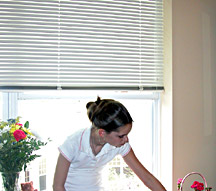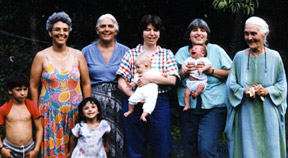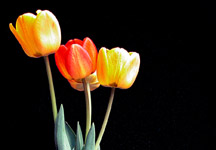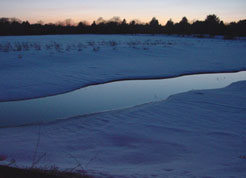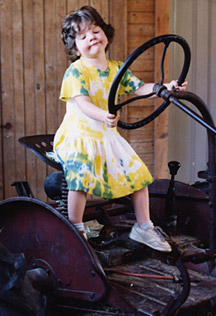Averno
Louise Gluck
Averno. Ancient name, Avernus. A small crater lake, ten miles west of Naples, Italy; regarded by the ancient Romans as the entrance to the underworld.
1
You die when your spirit dies.
Otherwise, you live.
You may not do a good job of it, but you go on —
something you have no choice about.
When I tell this to my children
they pay no attention.
The old people, they think–
this is what they always do:
talk about things no one can see
to cover up all the brain cells theyÃre losing.
They wink at each other;
listen to the old one, talking about the spirit
because he canÃt remember anymore the word for chair.
It is terrible to be alone.
I donÃt mean to live alone–
to be alone, where no one hears you.
I remember the word for chair.
I want to say–IÃm just not interested anymore.
I wake up thinking
you have to prepare.
Soon the spirit will give up–
all the chairs in the world wonÃt help you.
I know what they say when IÃm out of the room.
Should I be seeing someone, should I be taking
one of the new drugs for depression.
I can hear them, in whispers, planning how to divide the cost.
And I want to scream out
youÃre all of you living in a dream.
Bad enough, they think, to watch me falling apart.
Bad enough without this lecturing they get these days
as though I had any right to this new information.
Well, they have the same right.
TheyÃre living in a dream, and IÃm preparing
to be a ghost. I want to shout out
the mist has cleared–
ItÃs like some new life:
you have no stake in the outcome;
you know the outcome.
Think of it: sixty years sitting in chairs. And now the mortal spirit
seeking so openly, so fearlessly–
To raise the veil.
To see what youÃre saying goodbye to.
2
I didnÃt go back for a long time.
When I saw the field again, autumn was finished.
Here, it finishes almost before it starts–
the old people donÃt even own summer clothing.
The field was covered with snow, immaculate.
There wasnÃt a sign of what happened here.
You didnÃt know whether the farmer
had replanted or not.
Maybe he gave up and moved away.
The police didnÃt catch the girl.
After awhile they said she moved to some other country,
one where they donÃt have fields.
A disaster like this
leaves no mark on the earth.
And people like that–they think it gives them
a fresh start.
I stood a long time, staring at nothing.
After a bit, I noticed how dark it was, how cold.
A long time–I have no idea how long.
Once the earth decides to have no memory
time seems in a way meaningless.
But not to my children. TheyÃre after me
to make a will; theyÃre worried the government
will take everything.
They should come with me sometime
to look at this field under the cover of snow.
The whole thing is written out there.
Nothing: I have nothing to give them.
ThatÃs the first part.
The second is: I donÃt want to be burned.
3
On one side, the soul wanders.
On the other, human beings living in fear.
In between, the pit of disappearance.
Some young girls ask me
if theyÃll be safe near Averno–
theyÃre cold, they want to go south a little while.
And one says, like a joke, but not too far southó
I say, as safe as anywhere
which makes them happy.
What it means is nothing is safe.
You get on a train, you disappear.
You write your name on the window, you disappear.
There are places like this everywhere,
places you enter as a young girl,
from which you never return.
Like the field, the one that burned.
Afterward, the girl was gone.
Maybe she didnÃt exist,
we have no proof either way.
All we know is:
the field burned.
But we saw that.
So we have to believe in the girl,
in what she did. Otherwise
itÃs just forces we donÃt understand
ruling the earth.
The girls are happy, thinking of their vacation.
DonÃt take a train, I say.
They write their names in mist on a train window.
I want to say, youÃre good girls,
trying to leave your names behind.
4
We spent the whole day
sailing the archipelago,
the tiny islands that were part of the peninsula
until theyÃd broken off
into the fragments you see now
floating in the northern sea water.
They seemed safe to me,
I think because no one can live there.
Later we sat in the kitchen
watching the evening start and then the snow.
First one, then the other.
We grew silent, hypnotized by the snow
as though a kind of turbulence
that had been hidden before
was becoming visible,
something within the night
exposed nowó
In our silence, we were asking
those questions friends who trust each other
ask out of great fatigue,
each one hoping the other knows more
and when this isnÃt so, hoping
their shared impressions will amount to insight.
Is there any benefit in forcing upon oneself
the realization that one must die?
Is it possible to miss the opportunity of oneÃs life?
Questions like that.
The snow heavy. The black night
transformed into busy white air.
Something we hadnÃt seen revealed.
Only the meaning wasnÃt revealed.
5
After the first winter, the field began to grow again.
But there were no more orderly furrows.
The smell of the wheat persisted, a kind of random aroma
intermixed with various weeds, for which
no human use has been as yet devised.
It was puzzlingóno one knew
where the farmer had gone.
Some people thought he died.
Someone said he had a daughter in New Zealand,
that he went there to raise
grandchildren instead of wheat.
Nature, it turns out, isnÃt like us;
it doesnÃt have a warehouse of memory.
The field doesnÃt become afraid of matches,
of young girls. It doesnÃt remember
furrows either. It gets killed off, it gets burned,
and a year later itÃs alive again
as though nothing unusual has occurred.
The farmer stares out the window.
Maybe in New Zealand, maybe somewhere else.
And he thinks: my life is over.
His life expressed itself in that field;
he doesnÃt believe anymore in making anything
out of earth. The earth, he thinks,
has overpowered me.
He remembers the day the field burned,
not, he thinks, by accident.
Something deep within him said: I can live with this,
I can fight it after awhile.
The terrible moment was the spring after his work was erased,
when he understood that the earth
didnÃt know how to mourn, that it would change instead.
And then go on existing without him.


